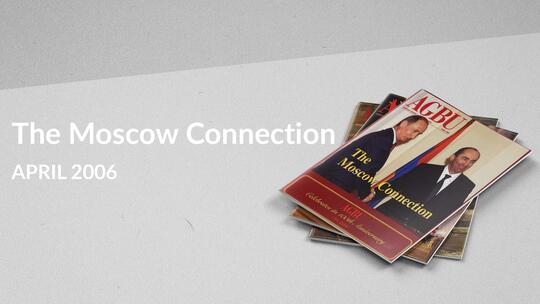by Suren Deheryan & Suren Musayelyan
The Moscow business journal Profile recently named Garegin Tosunian the sixth most influential financier in Russia, and the only Armenian in the top 10.
The 50-year-old, who in 2002 was elected president of the Association of Russian Banks (ARB) says ratings don’t impress him, and he attributes the accolade to the fact that he never refuses to speak to the media.
Born in Yerevan, Tosunian moved to Moscow in 1971 to study at Moscow State University, where he earned a PhD in physics and then a doctorate in law.
“I am grateful to this country as Moscow gave me everything to shape my personality,” he says. “I don’t accept it when my friends of different nationalities speak of Russia as ‘this’ country. I correct them that it is ‘our’ country.”
Tosunian pioneered banking law in post-Soviet Russia, which, coupled with his previous work as advisor to former Prime Minister of Russia Evgeniy Primakov, is one of the reasons why he is highly regarded. He is frequently quoted in the Russian news on issues of finance and business practices, and, apart from the media attention, enjoys wide respect among his professional contemporaries.
By his influence, banking law is a separate field in Russia that has relevant legislation. Now Tosunian heads the center of banking and financial law at the Institute of State and Law and also lectures at the chair of banking law at the Academy of Public Economy. “Despite being busy I always aspire to teach others, because I want to change the world in my field.”
Tosunian was one of the founders of the ARB in 1991 and a member of its Board. “In the ‘90s when cheating in the banking sphere was the norm, I was sincerely trying to build a new system of business practices,” he told AGBU.
The association he heads now includes 550 large banks of Russia, and has 650 members.
“I am trying to raise the idea of the national banking system of Russia to the level where it should be,” Tosunian says. “A healthy national banking system is needed to rebuild the country.
“I understand that in the initial period many questioned why an Armenian should head a Russian association, but you can meet such people everywhere. My post is an indicator that there is a positive attitude in this country towards representatives of other nationalities and in particular to Armenians.”
Distinctly Armenian, he is also patriotically Russian.
I have a historical homeland where I was born and raised, and a country that has developed my personality,” the banker says.
Recent years have seen strengthened relations between Armenian and Russian banking institutions, Tosunian says, boosted in part by an agreement of cooperation between the ARB and the Association of Banks of Armenia.
“We have established transparent cooperation between Russian banks and their Armenian affiliate banks. Such transparency creates confidence between the two business communities,” says Tosunian.
According to Tosunian, although the Armenian scale is comparatively small, in just the past few years Russian investment has been disproportionately active. “Perhaps it is connected with stability. And the strong link with Russia is an impetus for Russian investors in Armenia,” he says.
The centuries old link between the two countries is clearly being felt now in the expanding influence of Russian investment in Armenia, and in the leadership roles Armenians such as Tosunian have assumed in Russia.
Tosunian says that he wants to be among the Russian-Armenians investing in the “historical homeland”, but for the right business reasons.
“What Armenian would not want to have his own business under the foot of Mount Ararat,” he says. “Armenia is now going through processes that Russia already completed. If everything in Russia is already clearly distributed and sold out, then there are still many opportunities to develop small and medium enterprises in Armenia. It is enough to make a small investment and introduce a production culture in these facilities in Armenia for them to work effectively.”
Tosunian says while investment might appeal to some for patriotic reasons, Armenia is attractive to an investor because unlike many other CIS countries and even Russian provinces, “there is a strong respect toward other people’s property and ownership rights in Armenia.”
“I don’t like when people put their patriotism on show or hide behind it,” he says, adding that if he decides to be engaged in some business project in Armenia he would have to be present there personally.
Some of his colleagues say the current boom in construction and other business in Armenia reflect a trend by Armenians living in unstable economies to invest in property in Armenia as a backup.
Tosunian, however, sees the matter from a more pro-active viewpoint.
“I think there is a liberal regime in Armenia. It really makes sense to invest there,” he says. “If Armenia develops its infrastructure, it will be a country for profitable investments. If the issue of dual citizenship is solved, many Armenians will want to make investments in Armenia. There is potential and Armenia is indeed an attractive country in terms of making investments.”






